- Home
- John Scalzi
The Human Division #12: The Gentle Art of Cracking Heads Page 2
The Human Division #12: The Gentle Art of Cracking Heads Read online
Page 2
“That’s a big drink,” someone said to her a few minutes later. She looked up from her drink to see a generically handsome-looking man standing a few feet from her at the bar.
“The irony is that this is the small size,” Lowen said. “The large margarita here comes in a glass the size of a hot tub. It’s for when you’ve decided that alcohol poisoning is a way of life.”
The blandly handsome man smiled at this and then cocked his head. “You look familiar,” he said.
“Tell me you have better pickup lines than that,” Lowen said.
“I do,” the man said, “but I wasn’t trying to pick you up. You just look familiar.” He looked at her more closely and then snapped his fingers. “That’s it,” he said. “You look like that doctor at the Brazilian consulate bombing.”
“I get that a lot,” Lowen said.
“I’m sure you do,” the man said. “But it couldn’t be you, could it. You’re here in D.C. and the consulate was in New York.”
“Sound logic,” Lowen said.
“Do you have an identical twin?” the man asked, and then gestured at the bar stool next to Lowen. “Do you mind?”
Lowen shrugged and made a whatever hand movement. The man sat. “I don’t have an identical twin, no,” she said. “No fraternal twin, either. I have one brother. I pray to God we don’t look the same.”
“Then you could be that woman’s professional double,” the man said. “You could hire out for parties.”
“I don’t think she’s that famous,” Lowen said.
“Hey, she got a call from the president,” the man said. “When was the last time that happened to you?”
“You’d be surprised,” Lowen said.
“Cuba libre,” the man said to the bartender as she came up. He looked over to Lowen. “I’d offer to buy you a drink, but…”
“Oh, Lord, no,” Lowen said. “I’ll have to hire a taxi to get home after this thing, and I only live a couple of blocks away.”
“Cuba libre,” the man repeated, and then turned his attention to Lowen again. He extended his hand. “John Berger,” he said.
Lowen took it. “Danielle Lowen,” she said.
Berger looked momentarily confused and then smiled. “You are that doctor from the Brazilian consulate,” he said. “And you work for the State Department. Which is how you could be here and have been in New York yesterday. I’m sorry, let me introduce myself again.” Berger held out his hand once more. “Hello, I’m a moron.”
Lowen laughed and took his hand a second time. “Hello,” she said. “Don’t feel bad. I wasn’t exactly being forthcoming.”
“Well, after all the attention you got the last couple of days, I can see why you might want to lay low,” Berger said. He motioned to Lowen’s drink. “Is that what the tub of margarita is about?”
“What? No,” Lowen said, and made a grimace. “Well, maybe. Not exactly.”
“The drink is working,” Berger said.
“It’s not about the attention, although that certainly could have driven me to drink,” Lowen said. “It’s about something else, related to my job.”
“And what is that, if you don’t mind me asking?” Berger said.
“What do you do, Mr. Berger?” Lowen asked.
“John,” Berger said. His Cuba libre arrived. He smiled his thanks to the bartender and took a drink. Then it was his turn to grimace. “This is not the best Cuba libre I’ve had,” he said.
Lowen flicked the edge of her margarita glass with her finger. “Next time, go with one of these tubs,” she said.
“Maybe I will,” Berger said, took another drink of his Cuba libre and then set it down. “I’m a salesman,” he said. “Pharmaceuticals.”
“I remember you guys,” Lowen said.
“I bet you do,” Berger said.
“Now it makes sense,” Lowen said. “Easy conversationalist, blandly attractive, not too quirky, looking for the sale.”
“You have me pegged,” Berger said.
“You’re not going to make the sale,” Lowen said. “I mean, no offense. But I plan on walking out of here alone tonight.”
“Fair enough,” Berger said. “Good conversation was my only goal, anyway.”
“Was it,” Lowen said, and drank some more of her margarita. “All right, John, a question for you. How do you make a boring person a killer?”
Berger was quiet for a moment. “Now I’m suddenly very glad I won’t be making that sale,” he said.
“I’m serious,” Lowen said. “Hypothetically, you have this person. She’s a normal person, right? She has normal parents, has a normal childhood, goes to a normal school, gets normal degrees and then goes and has a normal job. And then one day, for no particularly good reason that anyone could see, she goes and murders some guy. And not in a normal way—I mean, not with a gun or a knife or a bat. No, she does it in a complicated way. How does that happen?”
“Is the guy an ex-lover?” Berger asked. “Hypothetically, I mean.”
“Hypothetically, no,” Lowen said. “Hypothetically, the best way to describe their relationship would be work colleagues, and not particularly close ones at that.”
“And she’s not a spy, or a secret agent, or leading a double life as a crafty assassin,” Berger said.
“She’s completely normal, and completely boring,” Lowen said. “Doesn’t even have pets. Hypothetically.”
Berger took a drink from his Cuba libre. “Then I’m going to go with what I know,” he said. “Mental derangement caused by addiction to pharmaceuticals.”
“There are drugs that can turn you from a boring person into a methodical murderer, as opposed to turning them into someone who kills everything in the house in a rage, including the fish?” Lowen asked. “I don’t remember those being touted to me when I was working as a doctor.”
“Well, no, there’s nothing that will do something that specific,” Berger said. “But you know as well as I do that, one, sometimes drug interactions will do funny things—”
“Turn someone into a methodical murderer?” Lowen asked again, incredulously.
“—and two, there are lots of our products out there that will eat your brain if you overuse them, and if they eat your brain, then you’ll start doing uncharacteristic things. Like becoming a methodical murderer, maybe.”
“A reasonable hypothesis,” Lowen said. “But hypothetically this person was not regularly taking either legal or illegal pharmaceuticals. Next.”
“All right,” Berger said, and gave the appearance of thinking quickly. “A tumor.”
“A tumor,” Lowen said.
“Sure, a tumor,” Berger said. “A brain tumor starts growing, hypothetically, and starts pressing on a part of the brain that processes things like knowing what is socially appropriate behavior. As the thing grows, our boring person starts putting her mind to murder.”
“Interesting,” Lowen said. She sipped her drink again.
“I’ve read stories about such things, and not only because my company sells a pharmaceutical treatment for cutting off the blood supply to tumorous masses in the body,” Berger said.
“It’s good to read for recreation,” Lowen said.
“I think so, too,” Berger said.
“And as superficially appealing as that suggestion is, this hypothetical person received a clean bill of health before her last assignment,” Lowen said. “It was hypothetically a job that required extensive amounts of travel, so a thorough physical examination was part of the job protocol.”
“This hypothetical person is getting very specific,” Berger said.
“I don’t make up the rules,” Lowen said.
“Yes, you do,” Berger said. “That’s why it’s a hypothetical.”
“One more chance, Mr. Berger, comma, John,” Lowen said. “So make it good.”
“Wow, on the spot,” Berger said. “Okay. Remote control.”
“What?” Lowen said. “Seriously, now.”
“Hear me
out,” Berger said. “If you wanted to do someone in, and have no one know, and completely cover your tracks, how would you do it? You would have someone that no one would ever expect do it. But how do you get them to do it? Skilled assassins may be good at looking like normal people, but the best assassins would be people who are normal people. So you find a normal person. And you put a remote control in their brain.”
“You’ve been reading a few too many science fiction thrillers,” Lowen said.
“Not a remote control that gives you gross control over a body, with everything herky jerky,” Berger said. “No, what you want is something that will lay across the frontal lobes and then subtly and slowly, over the course of time, bend someone towards doing the unspeakable. Do it so the person doesn’t even notice their own personality changing, or questions the necessity to kill someone. They just go ahead and plan it and do it, like they’re filing taxes or making a report.”
“I think people would notice a remote control in someone’s head, though,” Lowen said. “Not to mention the hypothetical person would remember someone opening up their skull to get inside of it.”
“Well, if you were the sort of people who would make this sort of remote control, you wouldn’t make it easy to find,” Berger said. “And you wouldn’t make it obvious when it was inserted. You’d find some way to slip it into their body when they weren’t expecting it.” He pointed at Lowen’s drink. “Nanobots in your drink, maybe. You’d only need a few and then you could program those few to replicate inside the body until you had enough. The only problem you might have is if the body starts trying to fight off the ’bots and then the person gets sick. That would present as, say, a meningitis of some sort.”
Lowen stopped sipping her drink and looked at Berger. “What did you just say?” she said.
“Meningitis,” Berger said. “It’s when there’s a swelling of the brain—”
“I know what meningitis is,” Lowen said.
“So it looks like meningitis,” Berger said. “At least until the people who have inserted the ’bots tweak the ’bots so that they don’t cause an immune response. And then after that, they stay in the brain, mostly passive and mostly undetectable, until they’re turned on and they perform their slow counterprogramming.”
Berger took another sip from his drink. “After that, it’s just a matter of timing,” he said. “You get the person with the remote control in the right places, let them use their own brains to take advantage of situations, and slip them just enough instruction and motivation that they do what you want them to, more or less when you want them to do it, and they think it’s their own idea. Their own quiet, secret idea that they feel no need to tell anyone else about. If they succeed, then the remote control shuts down and gets excreted out of the body over a few days and no one is the wiser, least of all the person who’s been remote controlled.”
“And if they fail?” Lowen asked, almost whispering.
“Then the person who’s being remote controlled finds a way to get rid of themself, so no one can find out about the remote control in their brain. Not that they know that’s why they’re doing it, of course. That’s the point of the remote control. Either way, you’ll never know that the remote control existed. You have no way of knowing. In fact, the only way you would ever know is if, say, someone who knows about these things tells you about them, perhaps because he’s sick of this sort of shit and doesn’t care about the consequences anymore.”
Berger slugged back the remainder of his Cuba libre and set it down on the bar.
“Hypothetically,” he said.
“Who are you?” Lowen said again.
“I told you, I’m a pharmaceutical salesman,” Berger said. He reached into his back pocket and took out his wallet and grabbed a couple of bills. “I’m a pharmaceutical salesman who was looking for some interesting conversation. I’ve had that, and I’ve had my drink, and now, I’m going to go home. That’s not what I suggest you do, however, Dr. Lowen. At least not tonight.” He dropped the bills onto the bar. “There, that should cover us both.” He held out his hand again. “Good night, Danielle,” he said.
Lowen shook his hand, dumbly, and then watched him walk out of the restaurant.
The bartender came over, took the bills and reached for Berger’s glass. “No,” Lowen said, forcefully. The bartender looked at her strangely. “Sorry,” Lowen said. “Just…don’t touch that glass, okay? In fact, I want to buy the glass from you. Ring it up for me. And bring me some coffee, please. Black.”
The bartender rolled her eyes at Lowen but went away to ring up the glass. Lowen pulled it closer to her by dragging it by the cocktail napkin underneath and then pulled out her PDA. She called James Prescott.
“Hi, Jim,” she said. “Don’t tell Dad, but I think I just got put in a hell of a lot of trouble. I need you to come get me. You might bring the FBI with you. Tell them to bring an evidence kit. Hurry, please. I don’t want to be out in the open any longer than I have to be.”
“You have an interesting relationship with trouble recently,” Prescott told her some time later, when they were both safely ensconced at Foggy Bottom, in Prescott’s office.
“You don’t think I like this, do you?” Lowen said. She sank lower into Prescott’s couch.
“I don’t think ‘like’ has anything to do with it,” Prescott said. “It doesn’t change the relevance of my statement, though.”
“You understand why I got paranoid, right?” Lowen said to Prescott.
“You mean, random man comes in, tells you a story that, as ridiculous as it is, perfectly explains the problem of Luiza Carvalho murdering Liu Cong, pays for your drink and then tells you not to go home?” Prescott said. “No, I have no idea why you feel paranoid in the slightest.”
“You have a bunker underneath this building, right?” Lowen said. “I think I want to go there.”
“That’s the White House,” Prescott said. “And relax. You’re safe here.”
“Right, because I haven’t had any buildings filled with diplomats blow up near me anytime recently,” Lowen said.
“Don’t make me paranoid, Danielle,” Prescott said.
The door to Prescott’s office opened and Prescott’s aide poked his head through. “The FBI just sent you a very preliminary report,” he said.
“Thank you, Tony,” Prescott said, and reached for his PDA. “Bring me some coffee, please.”
“Yes, sir,” he said. He turned to Lowen. “And for you, Dr. Lowen?”
“I don’t need to be any more jittery, thanks,” Lowen said. Tony closed the door.
“First things first,” Prescott said, reading the preliminary report. “‘John Berger,’ or at least the one you met, doesn’t exist. They cross-referenced the name with the tax database. There are ten John Bergers in the D.C. metropolitan area, but none of them live in Alexandria and none of them have as their occupation pharmaceutical salesman. This fact, I imagine, does not surprise you.”
“Not really,” Lowen said.
“The DNA we got off the glass is being processed and maybe they’ll have something for us later,” Prescott said. “They’ve run the fingerprints through federal and local and have come up with nothing. They’re checking the international databases now. They’ve also taken the bar security tape and used it to do facial recognition scanning. No results there so far, either.”
“So I’m not actually paranoid in this case,” Lowen said.
“No, you are actually paranoid,” Prescott said, setting down his PDA. “You’re just paranoid with good reason.”
“The story he told me is still nuts,” Lowen said.
“That it definitely is,” Prescott said. “The only real problem with it is that it’s not completely impossible. Carvalho killed Liu with blood-borne nanobots specifically designed to asphyxiate him. It’s not entirely crazy to believe that someone could design ’bots to work on the brain in the way your friend suggested. The Colonial Union’s BrainPals trigger parts of their own
ers’ brains. None of this is particularly new in its details. It’s how it’s being used that’s new. Hypothetically.”
Lowen shivered. “You know what, don’t use that word with me at the moment, please.”
“Okay,” Prescott said, a little warily. “The real problem we have with all of this is that we don’t have any way to verify it. The Colonial Union let Carvalho float out into space. We have a good story, but good stories aren’t enough.”
“You believe it,” Lowen said.
“I believe it’s possible,” Prescott said. “I believe it’s possible enough that I’m going to recommend to your father that we design a protocol for nanobiotic infestations and their eradication if and when we find them. The nice thing about this story is that even if it’s completely crazy, if we get a process out of it, then this particular avenue of sabotage gets closed. If it doesn’t exist, then it gets closed before it can become a problem.”
“Three cheers for paranoia,” Lowen said.
“What would really help, of course, is if we could find this friend of yours,” Prescott said. “Conspiracy theories involving remote controls in the brain are more believable when you have people who can accurately describe them.”
“I don’t think you’re going to manage that one,” Lowen said.
“Never say never,” Prescott said. The door opened and Tony came through, bearing coffee. “Your coffee,” he said. “Also, the FBI is requesting visual.”
“Right,” Prescott said, set his coffee down and picked up the PDA again, pausing briefly to also loop on an earpiece. “This is Prescott,” he said, looking into the PDA.

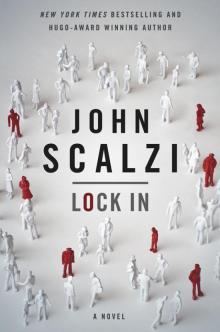 Lock In
Lock In Clash of the Geeks
Clash of the Geeks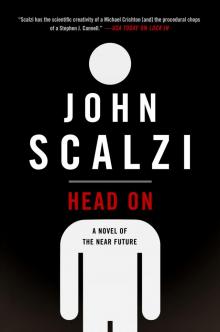 Head On
Head On The Dog King
The Dog King Old Man's War Universe: Short Stories
Old Man's War Universe: Short Stories The End of All Things
The End of All Things Tales From the Clarke
Tales From the Clarke The Human Division
The Human Division The Android's Dream
The Android's Dream An Election
An Election Zoe's Tale
Zoe's Tale Agent to the Stars
Agent to the Stars This Hollow Union
This Hollow Union The Gentle Art of Cracking Heads
The Gentle Art of Cracking Heads Old Man's War
Old Man's War The Tale of the Wicked
The Tale of the Wicked Your Hate Mail Will Be Graded: A Decade of Whatever, 1998-2008
Your Hate Mail Will Be Graded: A Decade of Whatever, 1998-2008 Judge Sn Goes Golfing
Judge Sn Goes Golfing The Back Channel
The Back Channel The Human Division 0.5 - After the Coup
The Human Division 0.5 - After the Coup Fuzzy Nation
Fuzzy Nation The Observers
The Observers This Must Be the Place
This Must Be the Place The Last Colony
The Last Colony Unlocked: An Oral History of Haden's Syndrome
Unlocked: An Oral History of Haden's Syndrome A Voice in the Wilderness
A Voice in the Wilderness Redshirts
Redshirts The Collapsing Empire
The Collapsing Empire The Last Emperox
The Last Emperox The God Engines
The God Engines A Problem of Proportion
A Problem of Proportion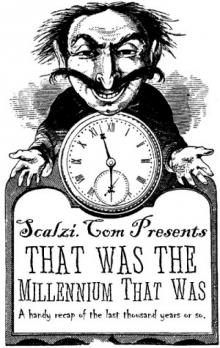 THAT WAS THE MILLENIUM THAT WAS
THAT WAS THE MILLENIUM THAT WAS The B-Team
The B-Team The Sound of Rebellion
The Sound of Rebellion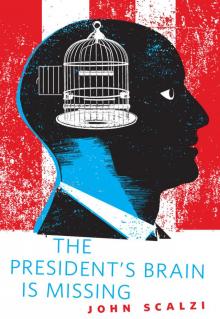 The President's Brain Is Missing
The President's Brain Is Missing Questions for a Soldier
Questions for a Soldier Walk the Plank
Walk the Plank We Only Need the Heads
We Only Need the Heads How I Proposed to My Wife: An Alien Sex Story
How I Proposed to My Wife: An Alien Sex Story Earth Below, Sky Above
Earth Below, Sky Above Everything but the Squeal
Everything but the Squeal Old Man’s War
Old Man’s War The Human Division #12: The Gentle Art of Cracking Heads
The Human Division #12: The Gentle Art of Cracking Heads This Must Be the Place thd-10
This Must Be the Place thd-10 A Voice in the Wilderness thd-4
A Voice in the Wilderness thd-4 The Observers thd-9
The Observers thd-9 The End of All Things: The Fourth Instalment
The End of All Things: The Fourth Instalment Earth Below, Sky Above thd-13
Earth Below, Sky Above thd-13 Zoe`s Tale вбиос-4
Zoe`s Tale вбиос-4 After the Coup
After the Coup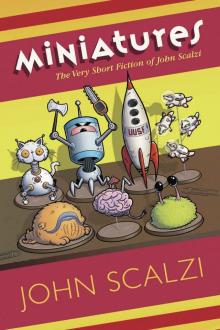 Miniatures: The Very Short Fiction of John Scalzi
Miniatures: The Very Short Fiction of John Scalzi The Last Colony вбиос-3
The Last Colony вбиос-3 Tales From the Clarke thd-5
Tales From the Clarke thd-5 Old Man's War omw-1
Old Man's War omw-1 The Human Division #8: The Sound of Rebellion
The Human Division #8: The Sound of Rebellion The Ghost Brigades omw-2
The Ghost Brigades omw-2 The Sagan Diary (old man's war)
The Sagan Diary (old man's war) The Sound of Rebellion thd-8
The Sound of Rebellion thd-8 The Human Division 13 - Earth Below, Sky Above
The Human Division 13 - Earth Below, Sky Above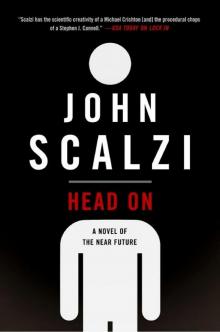 Head On_A Novel of the Near Future
Head On_A Novel of the Near Future The End of All Things: The First Instalment
The End of All Things: The First Instalment The B-Team thd-1
The B-Team thd-1 The Back Channel thd-6
The Back Channel thd-6 Walk the Plank thd-2
Walk the Plank thd-2 The Human Division #9: The Observers
The Human Division #9: The Observers The End of All Things: The Third Instalment
The End of All Things: The Third Instalment The Human Division #10: This Must Be the Place
The Human Division #10: This Must Be the Place The End of All Things #2: This Hollow Union
The End of All Things #2: This Hollow Union We Only Need the Heads thd-3
We Only Need the Heads thd-3 Metatropolis
Metatropolis The Dog King thd-7
The Dog King thd-7 The Consuming Fire (The Interdependency)
The Consuming Fire (The Interdependency) The Human Division #11: A Problem of Proportion
The Human Division #11: A Problem of Proportion